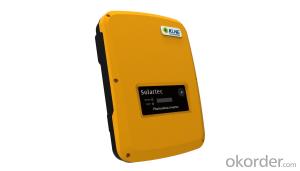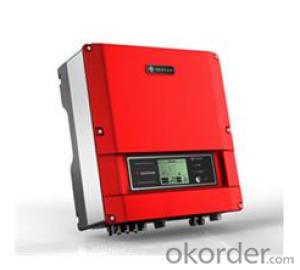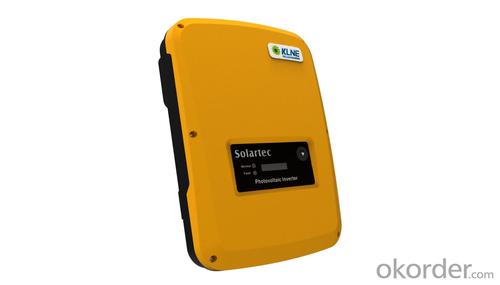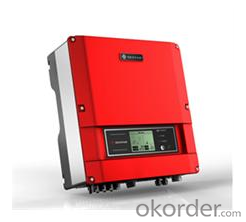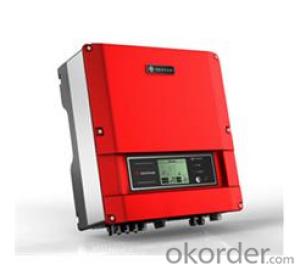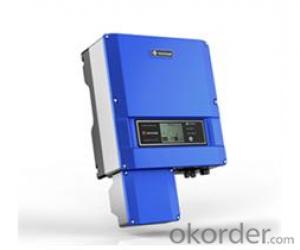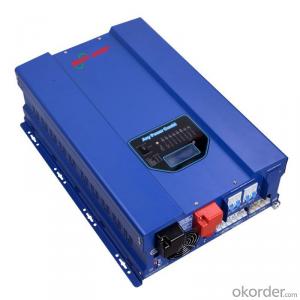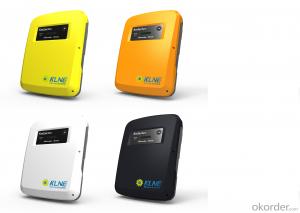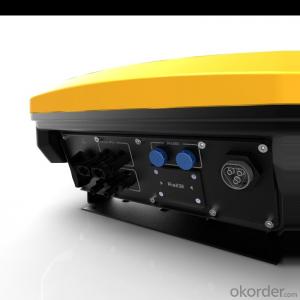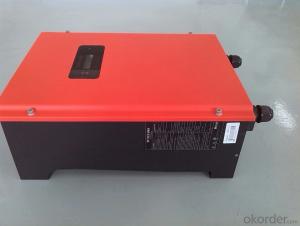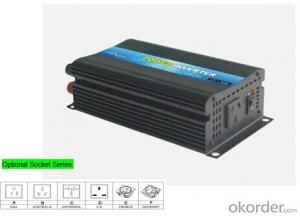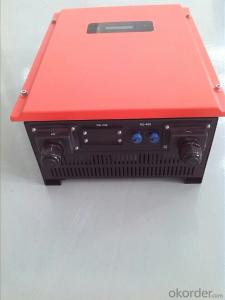300W Solar Inverter Off-Grid Type Solo-70 Series
- Loading Port:
- Shanghai
- Payment Terms:
- TT OR LC
- Min Order Qty:
- 10 unit
- Supply Capability:
- 1000 unit/month
OKorder Service Pledge
OKorder Financial Service
You Might Also Like
Product Description:
This system can keep 3 energy-saving bulbs with 11W working for 6 hours per day and a 5W radio working for 5 hours a day.
Output voltage:5V d. c. (USB port) / 12V d. c.
It can work for 3 successive rainy days.
● System voltage:12V
● Power:70W ● Dimensions of box:475*250*365mm ..
● Net weight of the box:9kg .
● Output DC current:5 phases..
● Charge and discharge current:10A..
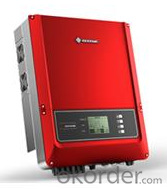 Product Advantages:
Product Advantages:
Product Advantages:
Powered by DC current
Can used out of doors
High effiency and low noise
FAQ
What is your payment terms?
We accept T/T payment, normally we need 20% T/T in advance, 80% payed before shipment.
What is your packing system?
We put the sistem in the wooden box.
Can you do OEM service?
Yes we can, but we need to do it with a certain order quantity.
- Q: After the PV inverter, how to achieve the same period before the network?
- When the voltage, frequency, phase does not meet the requirements, the automatic closing closing pulse.
- Q: Can a solar inverter be used with different grid voltages or frequencies?
- No, a solar inverter cannot be used with different grid voltages or frequencies. Solar inverters are designed to convert the DC power generated by solar panels into AC power that matches the specific voltage and frequency of the local electrical grid. Using a solar inverter with different grid voltages or frequencies can lead to compatibility issues and may result in inefficient or malfunctioning operation of the system.
- Q: Can a solar inverter be used with different types of solar charge controllers?
- Yes, a solar inverter can be used with different types of solar charge controllers as long as they are compatible with each other. However, it is important to ensure that the voltage and current ratings of the inverter and charge controller are compatible to avoid any damage to the system.
- Q: What is the role of a solar inverter in a solar power system?
- The role of a solar inverter in a solar power system is to convert the direct current (DC) electricity produced by the solar panels into alternating current (AC) electricity that can be used to power household appliances and be fed back into the electrical grid. The inverter also ensures that the power generated by the solar panels is at the correct voltage and frequency for safe and efficient use.
- Q: Are there any fire safety concerns associated with solar inverters?
- Solar inverters do pose some fire safety concerns. Although they are not typically a fire hazard themselves, there are a few potential risks to be aware of. Firstly, if the solar inverter is installed incorrectly, it can cause electrical problems that may lead to a fire. To prevent this, it is essential to hire a qualified and certified professional who can ensure that all electrical connections are secure and meet the necessary standards. Secondly, if the solar inverter is located in an area that experiences high temperatures or excessive heat, there is a risk of overheating. Inverters generate heat as they convert direct current (DC) from solar panels into alternating current (AC) for use in homes or businesses. If the inverter is not adequately ventilated or is exposed to extreme heat, it can overheat and potentially ignite a fire. Furthermore, if the inverter is faulty or damaged, it can increase the risk of fire. Regular maintenance and inspections of the solar inverter can help identify any potential issues and ensure its safe operation. To address these fire safety concerns, it is crucial to adhere to proper installation guidelines, regularly inspect and maintain the inverter, and ensure it is in a well-ventilated location away from sources of excessive heat. It is also advisable to have a fire extinguisher nearby and establish a fire safety plan in case of emergencies.
- Q: What is the role of a solar inverter in a residential system?
- The role of a solar inverter in a residential system is to convert the direct current (DC) electricity generated by the solar panels into alternating current (AC) electricity that is suitable for use in the home. It also manages the flow of electricity, monitors the system's performance, and ensures safety by providing protection against electrical faults.
- Q: Can a solar inverter be used with different types of power control devices?
- Yes, a solar inverter can be used with different types of power control devices. Solar inverters are designed to convert the direct current (DC) produced by solar panels into alternating current (AC) that can be used to power various electrical devices. They can be integrated with different power control devices such as charge controllers, smart energy management systems, and battery storage systems to optimize the efficiency and performance of the solar power system.
- Q: What is the role of an anti-islanding feature in a solar inverter?
- The role of an anti-islanding feature in a solar inverter is to ensure the safety of utility workers and prevent damage to the electrical grid. It detects when there is a power outage or grid disturbance and immediately shuts off the solar inverter to prevent it from continuing to generate electricity. This feature is crucial as it prevents the solar system from operating independently and feeding power back into the grid, which can be dangerous for utility workers trying to repair the power outage.
- Q: How does the input voltage range affect the performance of a solar inverter?
- The input voltage range of a solar inverter directly impacts its performance. A wider input voltage range allows the inverter to adapt to various solar panel configurations and environmental conditions, maximizing the system's overall efficiency. A limited input voltage range may result in reduced efficiency and output power, as the inverter may not be able to effectively convert the varying voltages produced by the solar panels. Additionally, a wider input voltage range provides flexibility in system design and allows for the incorporation of additional solar panels in the future without the need for significant modifications.
- Q: Are solar inverters compatible with smart home systems?
- Yes, solar inverters are compatible with smart home systems. In fact, many modern solar inverters are designed to integrate seamlessly with smart home technology, allowing homeowners to monitor and control their solar energy production and consumption through their smart devices. This integration enables better energy management, increased efficiency, and the ability to optimize the use of solar power within a smart home ecosystem.
Send your message to us
300W Solar Inverter Off-Grid Type Solo-70 Series
- Loading Port:
- Shanghai
- Payment Terms:
- TT OR LC
- Min Order Qty:
- 10 unit
- Supply Capability:
- 1000 unit/month
OKorder Service Pledge
OKorder Financial Service
Similar products
Hot products
Hot Searches
Related keywords
